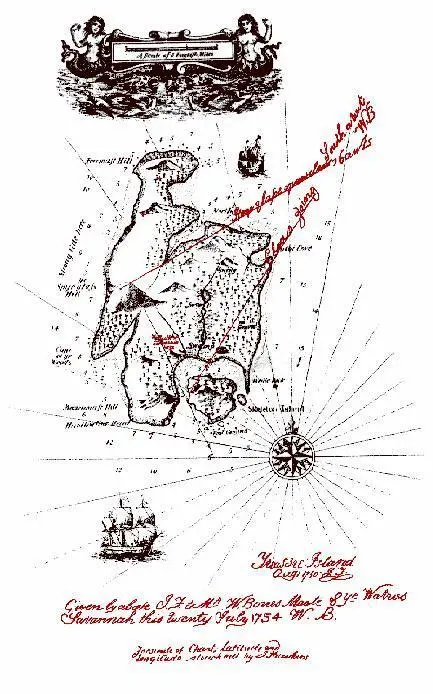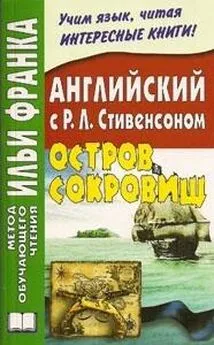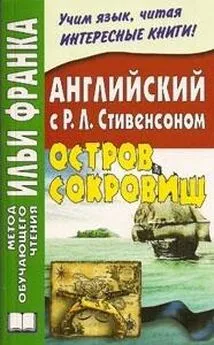Илья Франк - Английский язык с Р.Л. Стивенсоном. Остров сокровищ
- Название:Английский язык с Р.Л. Стивенсоном. Остров сокровищ
- Автор:
- Жанр:
- Издательство:неизвестно
- Год:неизвестен
- ISBN:нет данных
- Рейтинг:
- Избранное:Добавить в избранное
-
Отзывы:
-
Ваша оценка:
Илья Франк - Английский язык с Р.Л. Стивенсоном. Остров сокровищ краткое содержание
Английский язык с Р.Л. Стивенсоном. Остров сокровищ - читать онлайн бесплатно ознакомительный отрывок
Интервал:
Закладка:
Английский язык с Р.Л. Стивенсоном
Остров сокровищ
Robert Louis Stevenson
Treasure Island
Книгу подготовил Андрей Еремин
Метод чтения Ильи Франка
Мультиязыковой проект Ильи Франка www.franklang.ru
1

PART ONE (часть первая)
The Old Buccaneer (старый пират)
Chapter I (глава 1)
The Old Sea-Dog at the 'Admiral Benbow'
(старый морской волк в /трактире/ «Адмирал Бенбоу»)
Мультиязыковой проект Ильи Франка www.franklang.ru
2
1. SQUIRE TRELAWNEY, Dr Livesey (сквайр Трелони, доктор Ливси), and
the rest of these gentlemen (и остальные из этих джентльменов) having asked
me to write down (попросив = попросили меня описать) the whole particulars
about Treasure island (все подробности об Острове Сокровищ), from the
beginning to the end (от начала до конца), keeping nothing back but the bearings
of the island (скрывая ничего, но = кроме месторасположения острова), and
that only because there is still treasure not yet lifted (это только потому, что там
находятся все еще сокровища пока не выкопанные; to lift — поднять,
выкопать ), I take up my pen (я берусь за перо) in the year of grace 17 — (в 17..
году от Рождества Христова), and go back to the time (и возвращаюсь
/мысленно/ ко времени) when my father kept the 'Admiral Benbow' inn (когда
мой отец держал = владел трактиром «Адмирал Бенбоу» / адмирал Бенбоу
(1653-1702) — один из английских знаменитых морских героев /), and the
brown old seaman (и загорелый старый моряк), with the sabre cut (с сабельным
порезом = шрамом), first took up his lodging under our roof (впервые
поселился: «занял свое жилье» под нашей крышей).
buccaneer [bAkq`nIq] write [raIt] treasure [`treZq] island [`aIlqnd] bearings
[`beqrINz]
1. SQUIRE TRELAWNEY, Dr Livesey, and the rest of these gentlemen
having asked me to write down the whole particulars about Treasure island,
from the beginning to the end, keeping nothing back but the bearings of the
island, and that only because there is still treasure not yet lifted, I take up my
pen in the year of grace 17 —, and go back to the time when my father kept
the 'Admiral Benbow' inn, and the brown old seaman, with the sabre cut, first
took up his lodging under our roof.
Мультиязыковой проект Ильи Франка www.franklang.ru
3
1. I remember him as if it were yesterday (я помню его, словно это было вчера),
as he came plodding to the inn door (как он дошел, тяжело ступая, до двери
трактира; to plod — с трудом брести, еле тащиться, волочить ноги ), his sea-
chest following behind him in a handbarrow (его морской сундук, следующий
=следовал позади него на тачке ; barrow — тележка ); a tall, strong, heavy, nut-
brown man (высокий, сильный, грузный смуглый человек; nut-brown —
каштановый цвет; nut — орех ); his tarry pigtail falling over the shoulders (его
просмоленная косичка: «поросячий хвостик», спадавшая на плечи) of his
soiled blue coat (просаленного синего кафтана); his hands ragged and scarred
(его руки, шершавые и в рубцах), with black, broken nails (с черными
сломанными ногтями); and the sabre cut across one cheek (сабельный шрам во
всю щеку; across — поперек, через ), a dirty, livid white (грязного, сине-белого
/цвета/). I remember him looking round the cove (помню его осматривавшего =
как он осмотрел бухту) and whistling to himself as he did so (и, посвистывая
/себе/, когда он проделывал это), and then breaking out in that old sea-song
(затем загорланил старую матросскую песню; to break out in — разразиться,
внезапно начинать ) that he sang so often afterwards (которую он пел так часто
потом):
2. 'Fifteen men on the dead man's chest (пятнадцать человек на сундук
мертвеца) —
Yo-ho-ho, and a bottle of rum (йо-хо-хо, и бутылка рома)!'
handbarrow [,hxnd`bxrqu] heavy [`hevI] tarry [`tRrI] sabre [`seIbq] cove
[`kquv]
1. I remember him as if it were yesterday, as he came plodding to the inn
door, his sea-chest following behind him in a handbarrow; a tall, strong,
Мультиязыковой проект Ильи Франка www.franklang.ru
4
heavy, nut-brown man; his tarry pigtail falling over the shoulders of his soiled
blue coat; his hands ragged and scarred, with black, broken nails; and the
sabre cut across one cheek, a dirty, livid white. I remember him looking round
the cove and whistling to himself as he did so, and then breaking out in that
old sea-song that he sang so often afterwards: —
2. 'Fifteen men on the dead man's chest —
Yo-ho-ho, and a bottle of rum!'
1. in the high, old tottering voice (высоким, старческим дрожащим голосом)
that seemed to have been tuned and broken at the capstan bars (который,
казалось, прозвучал и прервался на вымбовке = звучал, словно скрипучие
брусья лебедки; to break — ломаться, затихать; capstan — ворот /кабестан/
— тяжелый = массивный барабан из дерева или железа, установленный
вертикально на палубе судна. Он вращается с помощью рычагов, и тяжелые
якоря поднимаются или опускаются с помощью канатов, или якорных цепей,
наматываясь на ворот ). Then he rapped on the door (затем он стукнул по
двери) with a bit of stick like a handspike (палкой, похожей на рычаг для
поворота ворота; handspike — вымбовка — тяжелый брусок или рычаг из
дерева, который используется для вращения ворота ) that he carried (которую
нес), and when my father appeared (и когда мой отец показался), called roughly
for a glass of rum (потребовал грубо стакан рому).
tottering [`tOtqrIN] voice [vOIs] tuned [tjHnd] handspike [`hxndspaIk] roughly
[`rAflI]
Мультиязыковой проект Ильи Франка www.franklang.ru
5
2. This, when it was brought to him (его /ром/, когда он был принесен ему; to
bring — приносить, доставлять ), he drank slowly (он пил медленно; to drink ),
like a connoisseur (как знаток), lingering on the taste (медля/мешкая на глотке =
смакуя каждый глоток), and still looking about him (и все осматриваясь вокруг
себя = поглядывая) at the cliffs and up at our signboard (на утесы и вверх на
нашу вывеску).
3. 'This is a handy cove (это удобная бухта),' says he, at length (сказал он,
наконец); 'and a pleasant situated grog-shop (и славно расположенная винная
лавка; grog — грог /горячий алкогольный напиток, разновидность пунша,
приготовляемый на основе рома, коньяка или водки и горячей воды с сахаром
и пряностями и употребляемый только в холодное время года/ ). Much
company, mate (много гостей = посетителей, приятель)?'
connoisseur [kOnq`sq:] signboard [`saInbLd] length [leNT] pleasant [pleznt]
4. My father told him no (отец сказал ему, /что/ нет), very little company (очень
мало народу), the more was the pity (тем хуже = к сожалению: «тем болшье
была жалость»).'
1. in the high, old tottering voice that seemed to have been tuned and broken
at the capstan bars. Then he rapped on the door with a bit of stick like a
handspike that he carried, and when my father appeared, called roughly for a
glass of rum.
Мультиязыковой проект Ильи Франка www.franklang.ru
6
2. This, when it was brought to him, he drank slowly, like a connoisseur,
lingering on the taste, and still looking about him at the cliffs and up at our
signboard.
3. 'This is a handy cove,' says he, at length; 'and a pleasant situated grog-shop.
Much company, mate?'
4. My father told him no, very little company, the more was the pity.'
1. 'Well, then (итак),' said he, 'this is the berth for me (эта якорная стоянка для
меня). Here you matey (сюда, браток),' he cried to the man who trundled the
Читать дальшеИнтервал:
Закладка:


